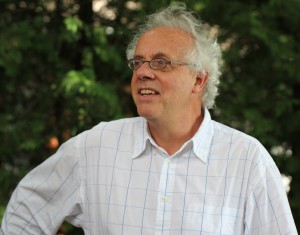That said, I believe that death is a very individual experience and no two deaths are exactly the same. How do I want to die? Thinking about it is not a pastime that would be productive. Only that I want to be at peace with my God and my loved ones and feel that my life has left the world a little better place. Then I will be best ready to accept whatever death I face. I have almost been there once, at age 55, and as a result, fear of dying is not as horrible as it once was.
Richard Smith: Dying of cancer is the best death
31 Dec, 14 | by BMJ
 Luis Buñuel, filmmaker, surrealist, iconoclast, moralist, and revolutionary, thought a lot about death. “Sometimes,” he wrote in 1982, a year before he died at 83, “I think the quicker the better—like the death of my friend Max Aub, who died all of a sudden during a card game. But most of the time I prefer a slower death, one that’s expected, that will let me revisit my life for a last goodbye.”
Luis Buñuel, filmmaker, surrealist, iconoclast, moralist, and revolutionary, thought a lot about death. “Sometimes,” he wrote in 1982, a year before he died at 83, “I think the quicker the better—like the death of my friend Max Aub, who died all of a sudden during a card game. But most of the time I prefer a slower death, one that’s expected, that will let me revisit my life for a last goodbye.”How do you want to die? You must think about it.
Buñuel was clear about how he didn’t want to die. “I’m not afraid of death. I’m afraid of dying alone in a hotel room, with my bags open and a shooting script on the night table. I must know whose fingers will close my eyes.”
“An even more horrible death,” he wrote, “is one that’s kept at bay by the miracles of modern medicine, a death that never ends. In the name of Hippocrates, doctors have invented the most exquisite form of torture ever known to man: survival.”
Buñuel saw how Franco died and found himself pitying a man he hated. Franco’s death in 1975 still stands for the most horrible medical death, a death that only doctors could devise. Organ after organ failed, and the doctors tried to compensate. As a medical student a year before graduation, I watched in horror. I think of the death as an incompetent carpenter trying to get a table level, sawing something of one leg, then the next, and eventually ending with the table on the floor.
Buñuel died of pancreatic cancer in Mexico City in 1983. He spent his last week discussing theology with a Jesuit brother.
His long time friend and collaborator, Jean-Claude Carrière, wrote: “Luis waited for death for a long time, like a good Spaniard, and when he died he was ready. His relationship with death was like that one has with a woman. He felt the love, hate, tenderness, ironical detachment of a long relationship, and he didn’t want to miss the last encounter, the moment of union. ‘I hope I will die alive,’ he told me. At the end it was as he had wished. His last words were ‘I’m dying’.”
Will you be ready? Will I be ready?
There are, as I endlessly repeat, essentially four ways to die: sudden death; the long, slow death of dementia; the up and down death of organ failure, where it’s hard to identify the final going down, tempting doctors to go on treating too long; and death from cancer, where you may bang along for a long time but go down usually in weeks. Suicide, assisted or otherwise, is a fifth, but I’m leaving that on one side for now.
I often ask audiences how they want to die, and most people chose sudden death. “That may be OK for you,” I say, “but it may be very tough on those around you, particularly if you leave an important relationship wounded and unhealed. If you want to die suddenly, live every day as your last, making sure that all important relationships are in good shape, your affairs are in order, and instructions for your funeral neatly typed and in a top draw—or perhaps better on Facebook.”
The long, slow death from dementia may be the most awful as you are slowly erased, but then again when death comes it may be just a light kiss.
Death from organ failure—respiratory, cardiac, or kidney—will have you far too much in hospital and in the hands of doctors.
So death from cancer is the best, the closest to the death that Buñuel wanted and had. You can say goodbye, reflect on your life, leave last messages, perhaps visit special places for a last time, listen to favourite pieces of music, read loved poems, and prepare, according to your beliefs, to meet your maker or enjoy eternal oblivion.
This is, I recognise, a romantic view of dying, but it is achievable with love, morphine, and whisky. But stay away from overambitious oncologists, and let’s stop wasting billions trying to cure cancer, potentially leaving us to die a much more horrible death.
Richard Smith was the editor of The BMJ until 2004. He is now chair of the board of trustees of icddr,b [formerly International Centre for Diarrhoeal Disease Research, Bangladesh], and chair of the board of Patients Know Best. He is also a trustee of C3 Collaborating for Health.
Competing interest: RS will die, perhaps soon: he’s 62.
No comments:
Post a Comment